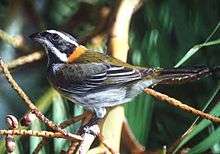Spindalis
| Spindalis | |
|---|---|
 | |
| Male Puerto Rican spindalis, Spindalis portoricensis | |
| Scientific classification | |
| Kingdom: | Animalia |
| Phylum: | Chordata |
| Subphylum: | Vertebrata |
| Class: | Aves |
| Order: | Passeriformes |
| Family: | Incertae sedis |
| Genus: | Spindalis Jardine & Selby, 1837 |
| Species | |
|
Spindalis dominicensis | |
Spindalis is a genus consisting of four non-migratory bird species. The genus is considered endemic to the Greater Antilles; a population on Cozumel Island, off the Yucatán Peninsula's east coast, is part of that island's West Indian fauna. Traditionally considered aberrant tanagers, current studies indicate a different placement.
Spindalis males are characterized by bright plumage while females are duller and have a different coloration.
The nests of Spindalis are cup-shaped.[1]
- Western spindalis, Spindalis zena
- Puerto Rican spindalis, Spindalis portoricensis
- Hispaniolan spindalis, Spindalis dominicensis
- Jamaican spindalis, Spindalis nigricephala
Historically, the genus consisted of a single polytypic species, Spindalis zena (with the common name of stripe-headed tanager), with eight recognized subspecies—S. z. townsendi and S. z. zena from the Bahamas, S. z. pretrei from Cuba, S. z. salvini from Grand Cayman, S. z. dominicensis from Hispaniola and Gonâve Island, S. z. portoricensis from Puerto Rico, S. z. nigreciphala from Jamaica, and S. z. benedicti from Cozumel Island. In 1997, based primarily on morphological and vocalization differences, three of the subspecies (portoricensis, dominicensis and nigricephala) were elevated to species status. S. zena remained a polytypic species with five recognized subspecies—S. z. pretrei, S. z. salvini, S. z. benedicti, S. z. townsendi, and S. z. zena.[2]
References
- O. H. Garrildo; K. C. Parkes; G. B. Reynard; A. Kirkcornell & R. Sutton (December 1997). "Taxonomy of the Stripe-Headed Tanager, genus Spindalis (Aves:Thraupidae) of the West Indies". The Wilson Bulletin. 109 (4): 561–594.